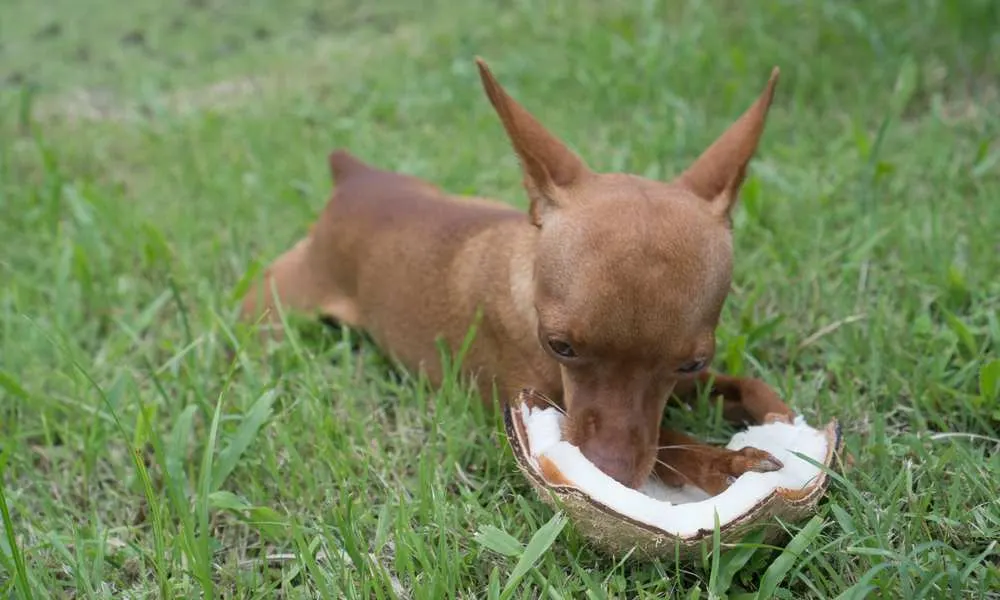Coconut is a superfood for humans that offers many health benefits. It is used in different forms, from oil to meat. This makes many wonders if their four-legged family members can also benefit from this tasty food.
Dogs are omnivores, just like their owners, and they can digest a great number of foods but several foods can be toxic for their bodies. Any brand of kibble will offer a fortified diet that will keep your pet healthy, but many pet owners, want to give an occasional treat.

Is Coconut Safe?
The quick response to the safety of coconuts for dogs is that they are safe. However, you must realize that several stipulations come with feeding your dog any food designed for human consumption. The first stipulation is to make sure you moderate the amount your dog is given.
In addition, the shell of the coconut is dangerous so you need to make sure you cut the exterior off before feeding. The dangerous part is the exterior part is something that would look like a great chew toy, so you mustn’t leave it lying around.
After you have disposed of the exterior to the coconut, the flesh is extremely safe for your pooch. You can feed it to your dog raw, or you can dry it into flakes and mix it into their kibble for a nice treat. If your dog is prone to bloating or intestinal issues, you will want to be very careful about the amount you give your dog. This is because coconut has higher levels of triglycerides in it and can exacerbate the problem.

Forms Of Coconut
Humans tend to get on the bandwagon of many things when it sounds good, creating regular fads. Some of these fads are good things and others can be detrimental to health. Coconut oil and water are some of these fads, and thankfully it is very healthy for humans.
The oil can be used for cooking if it is high quality, while lower quality is found in hair and body products. It is also found to cure simple fungal or bacterial infections. Coconut water is a tasty beverage that helps rehydrate someone who needs electrolytes.
While it is very healthy for humans, coconut oil should be given only in moderation to dogs. Dogs process fatty foods differently than humans and it may cause intestinal trouble or weight gain for your pet. With that said, coconut oil will help your dog’s coat and skin.
With coconut oil and water, you must purchase products that are 100% pure and no sugar added. You can find coconut products at almost all department and grocery stores. This does not mean they are best for your dog, so get ready to read the labels on all of the products you purchase.
The lower quality is not bad if you are purchasing it for dog bathes or lotions. However, if you are planning to allow your dog to consume any of the products, you will want to make sure there are no additives that could make your dog ill.

Health Benefits
Health fads can be a dangerous thing when people believe a certain product is the best thing for a person or animal they love. Some things are advertised to be a better and healthier choice when in reality it makes little to no difference. However, coconut has shown in several studies the antioxidants found in the food have anti-inflammatory assets.
This makes it really good for older dogs with arthritis or pups with skin allergies that can develop hotspots. It is also ideal to help calm the skin on animals that have battled fleas. Finally, there are a few studies that show coconut water helps keep dogs better hydrated while fighting influenza or other health infections.

Giving Coconut To Dogs
The flesh of the coconut should be introduced slowly to your canine and given as a treat. The water can be given mixed in with your dog’s normal water dish, or as a treat with a meal. However, coconut oil is something that should be introduced very slowly.
Smaller dogs should have no more than a quarter teaspoon drizzled over one of their daily meals, and big dogs should have less than a tablespoon. Talk to your veterinarian before starting the oil, because it can cause obesity in dogs. Most veterinarians would prefer to monitor the animal’s weight to make sure there does not need to be an adjustment in the amount of oil given.
When shopping for coconut oil to make fat bombs or topical applications, look for one that says organic, cold-pressed, and virgin. The topical application can be as simple as putting some of the oil on your fingers and massaging it into your dog’s skin. If you are considering using coconut oil to treat scrapes or cuts, you will want to make a topical antibiotic cream.
This is done by placing some coconut oil into a jar and letting it warm or soften before you add 10-12 drops of oregano oil into the jar. Mix the oils completely and then you can spread it on the skin just like you would any other topical ointment. While it is safe for the dog to lick, you will want to try to keep your pup from licking the wound to prevent hotspots or infections.
As you can see, there are numerous benefits to dogs with coconuts. The major side effect of coconut is digestive problems and obesity, but that is easy to monitor with veterinarians being aware of what you are feeding your dog.
Dogs love to be able to eat the same things that their human parent does and generally this is a bad idea. However, coconut is one food that you will not have to be as concerned about if they get ahold of. Just make sure you do not leave the shell laying around and you are good to go, as this is the only toxic part of the fruit.
Learn More: What Can Dogs Eat? A Comprehensive List Of Dog-safe Foods

